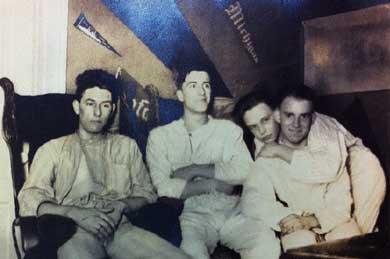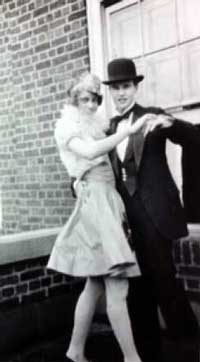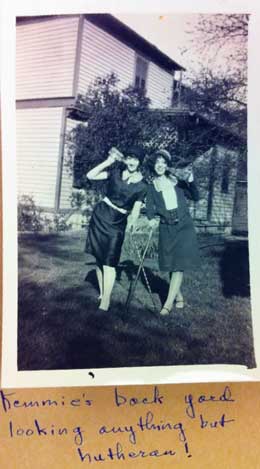
University of Michigan students in the 1920s. ‘You are no longer a high school boy or girl,’ wrote President Burton in a book by and for U-M freshmen. The advice, full of strict admonitions, revealed a world where the old social order was changing fast. (Image courtesy U-M Bentley Historical Library.)
“You are no longer a high school boy or girl,” U-M President Marion LeRoy Burton warned members of the entering class in 1921. “You are a college man or woman. This University is a place of freedom … But do not forget, I beg of you, that independence and freedom do not mean anarchy and license.”
With those stern words, the popular President Burton introduced the campus to a little book called “Advice to Freshmen by Freshmen.” Just 109 pages long, it gives a revealing glimpse of student life at the start of the “Roaring Twenties.”
“I should like to advise every Freshman,” Burton wrote, “to read this little book very carefully.”
* * *
“Advice to Freshmen by Freshmen” was written by a little collective of students at the end of their first year on campus. Their names are lost except for one, Lionel G. Crocker, a member of Theta Chi listed as the copyright holder. The dedication—”To The Pleasant Associations With Freshman Rhetoric In 202 West Hall”—suggests it was begun as a class project.
The authors’ advice hints at a social order under stress. Enrollments were surging, and the 19th-century ethos of college as a bastion of the upper crust was giving way to a more democratic culture. The writers of “Advice” were finger-waggers, instructing those they saw as rubes and social climbers in the manners and morals of a passing regime.These were the key instructions:
Respect class hierarchy. Freshmen should know their place, like children.

“By the end of the first semester you will call many [men] by their first names or nicknames,” the guide promises, “but not too many.” (Image courtesy U-M Bentley Historical Library.)
Mind your appearance.
Important at all times, this was downright urgent in the ordeal of the Greek rush, especially for women, since, though “there are many fine independent girls in school,” it was understood that “down in her innermost soul, every girl who comes to college cherishes the hope that she will be a sorority girl.”

Kappa Kappa Gamma, circa 1920. “Down in her innermost soul,” the guide for freshmen proclaimed, “every girl who comes to college cherishes the hope that she will be a sorority girl.” (Image courtesy U-M Bentley Historical Library.)
A girl going through Rush must mind every detail.
“Have your shoes shined and your hair net intact; remember that you are on exhibition and you want to look your best; a mere trifle like a missing hook often is the reason why a charming girl does not ‘make’ a sorority to which she has been rushed.”
Men, too, must be on guard against small slips, especially “if you are a stranger” to a particular fraternity, with no “legacy” connections with the “brothers.”
“You may rest assured that you are going to be subjected to a pretty stiff inspection. The points that count most are money, personality, athletics, and scholarship … Watch your step. Every act … counts either for or against you. If you are blessed with an abundance of money, don’t advertise it … If you are exceptionally witty and bright, keep the dimmers on until the proper time.”
Be a good mixer.
Like young Babbitts, the writers of “Advice” preached the value of broadening your circle of acquaintances (but only of the better sort) and making friends (but not too many).

“Avoid perpetually escorting a co-ed around the campus,” said the guide. ” (Image courtesy U-M Bentley Historical Library.)
“There are many places you will meet people, men mostly. Women at Michigan are not, by far, to be looked down upon but men are important. There will be dances, mixers, smokers and other functions. If you can break away from your studies for a few minutes, your time won’t be wasted … By the end of the first semester you will call many by their first names or nicknames, but not too many. Often calling a man by his first name on a short acquaintance is regarded as an imposition and is resented.”
Women were cautioned to “be a good sport”—”the sum total of all that is desirable in a Michigan Co-ed”—that is, “to bend to the wishes and inclinations of others occasionally [and] gracefully, but without losing your own personality.” Above all, don’t be a bore, since “bores are numerous here, and needlessly so.”
“A bore drifts into other people’s rooms, occupies their best chair; eats their fudge; reads their new magazines before they themselves have a chance to; plays their Victrola and scratches their best records. A bore talks hours at a time about people whom you have never heard of and in whom you haven’t the slightest atom of interest … She is avoided like the plague.”
Resist temptation.
With the Jazz Age just underway, the authors of “Advice” were on the lookout for the lower forms of pleasure, even motion pictures, for “a very dangerous disease in a college town is the movie mania.”

Prohibition was in full force and the “Advice” book admonished against getting “stewed.” (Image courtesy U-M Bentley Historical Library.)
In the era of Prohibition, bootleg booze was a danger.
“You will probably hear about the ‘student stills.’ Please remember that it is not necessary to be ‘stewed’ to be a ‘stude.’ If you have heard, resist the temptation.”
Men should be polite to the women on campus, even friendly. But they were warned against the disreputable practice of “fussing”—paying constant, fawning attention to co-eds.
“The habitual ‘fusser’ is the worst campus pest. Avoid perpetually escorting a co-ed around the campus. It is positively sickish to see a college man studying in the library with a co-ed … Are you forgetting what you came here for?”
The darker temptations could not even be mentioned by name.
“Do away with the idea that a young man has to ‘sow his wild oats.’ Some students come here hoping to see how bad the world can be and go much farther than they expect. Terrible diseases are in many cases the result. Think of the folks at home. Remember your Mother.”
The co-eds themselves were apparently above temptations of the flesh. The advice on morals was directed only at men.
What about you? What was the best advice YOU got when you started college? What was the worst? What advice was the most hopeless or pointless? Share your stories in the comments section.




Cass Casucci - 1967
I would like to give a copy of this to each of my grandchildren when they start. I’m sure life will be much different when they start to show up in 2020 than it was when my mother arrived in the 30’s.
Reply
Shari Berkowitz - 1992
This is fantastic! Thank you for the article! I look forward to reading this precious little book! Great fun!
Reply
Leslie Kehoe - 2008
Great article! The book sounds interesting and I would some day like to track down a copy. It’s interesting that some of the advice still holds true, even if some of it contains antiquated views of women! It is also a refreshing retort to those in society now who claim that young people “are not what they used to be”; it seems that even young people in the ’20s wanted to push the limits. Maybe we are not so different in 2012…
Reply
Rachel Estrada - 2004
The photographs are simply fantastic!
Reply
Ralph Fear - (1958) 1961
My father had two advisory comments. “If you see trouble down the street, turn around and walk the other way.” “Stay out of the bars.” The rest he left up to me, that he and Mom had inculcated an acceptable work and social ethics code. I wandered a bit, as did we all. The 50 year class reunion was a very nice reward for mostly reasonable comportment.
Reply
Ben Schultz - 1980
I love this article. It is fun, historical and I can just see the finger-wagging upper-class folk doing the scolding. Thank God we outgrew it. It would be wonderful to know the names of the people in the photos…
Reply
Christine Baird - x1958, 1982
Ha, they really knew how to banter in those days. None of this would have been taken seriously, but it\’s so cute.
Reply
Tracey Baetzel - 1976
A delightful trip back in time – I absolutely love the photos! Wouldn’t it be fun to have a current class do the 2012 version of the book for the 2112 edition of the newsletter?
Reply
Chris Campbell - 1972,1975
The named author of the booklet became a speech professor and taught at Denison University, where I got my undergraduate degree. He was still teaching when I was a sophomore (1967).
Reply
Roberta Van Meter - 1970
My father told me that some people on campus might lead me astray into Un-American activities. In my sophomore year I was on the bus to Washington to march against the Vietnam War!
Reply
Kirsten Herold - 1992
What I find interesting to muse on is to what extent the things we today take for granted will look old and fusty a few generations from now.
And some of the sorority advice — about every little detail mattering — is still only too true.
Reply